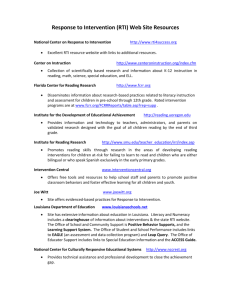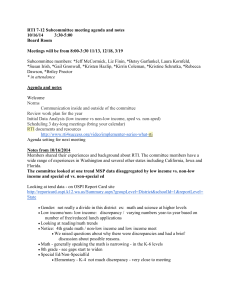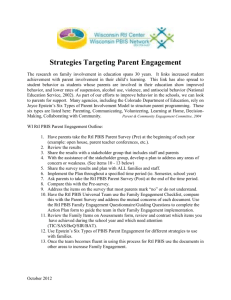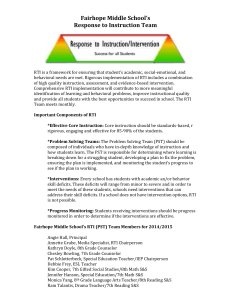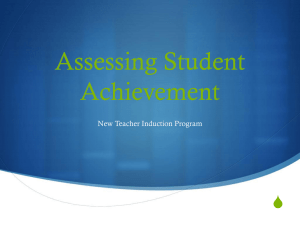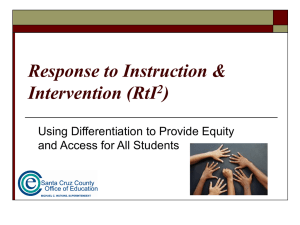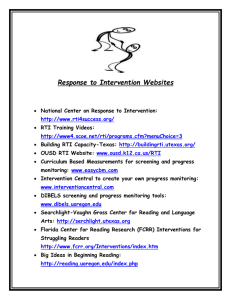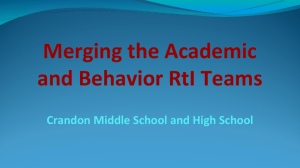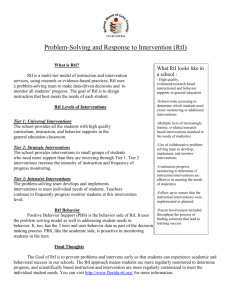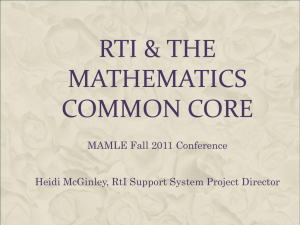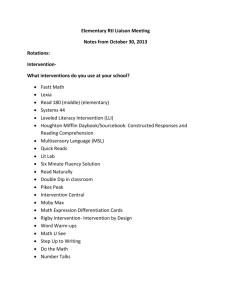2_RtI_PDSeries_Day2_Presentation
advertisement
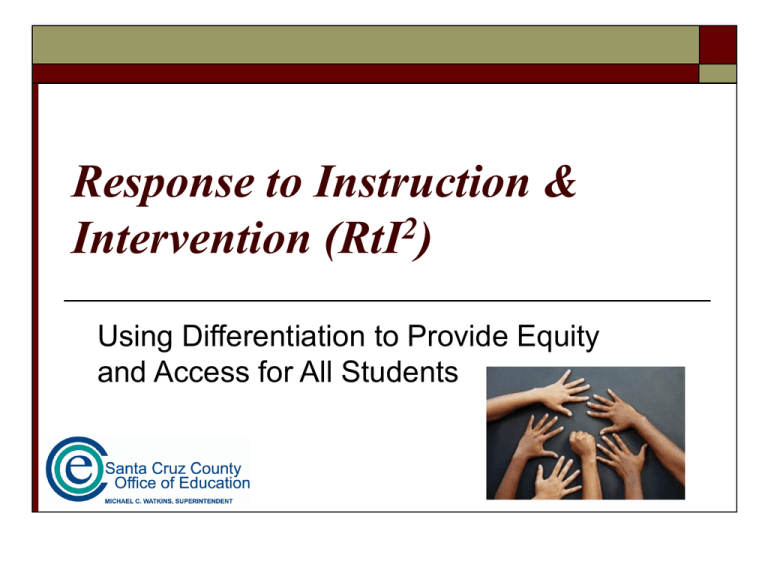
Response to Instruction & Intervention (RtI2) Using Differentiation to Provide Equity and Access for All Students Who Are Our Underserved Students? What does the data tell us? Day 2 Learning Outcomes Identify which students have not demonstrated mastery of essential standards Identify effective instructional practices for addressing gaps Develop common assessment to identify students in need of additional support Learn about PBIS and how it connects to RtI Explore Universal Screening Assessments, sample schedules, strategies for intervention and differentiation Our Beliefs RtI2 is not a program, but a process and framework for consolidating and using your existing resources wisely RtI2 is designed to assure high levels of learning for all students Essential Characteristics of RtI Collective responsibility Quality core instruction Universal screening and diagnostic assessment Research-based supplemental services and interventions Progress monitoring – Use of data to make instructional and intervention decisions Quality problem solving Guaranteed access for all students (http://www.rti4success.org/) The RtI2 – PLC Link 2 RtI cannot be implemented effectively without a collaborative process in place for on-going progress monitoring and looking at data. Over the past decade, two proven processes have been developed to achieve this goal: IEPs & Marathon Meetings Progress Monitoring happens at each tier! SSTs, & Marathon Meetings PBIS: Family Support Teams PLCs/Data Teams, Grade Level/Dept. Teams, & Marathon Meetings Problem Solving Process (COI) Define the problem Analyze the problem Why is it happening? Develop a Plan Where are our gaps? What shall we do about it? Evaluate Did our plan work? PLC Video What does the data say? Identify Identify Gaps Strengths (content/subgroups) Next Steps(Strategies) Assessments – (formative /common) MATH 1. What do we expect students to learn? 2. How will we know when they have learned it? 3. How will we respond when they have/haven’t learn? 4th Grade Math Content Cluster Data Blue Prints Release Questions Research Based Strategies Brainstorm Strategies Sample Formative Assessment A PLC Gone Awry Group Work Using Your Data What does the data say? Identify Identify Gaps Strengths (content/subgroups) Next Steps(Strategies) Assessments – (formative /common) MATH http://www.cde.ca.gov/ta/tg/sr/resources.asp No One Said it Would be Easy The mindset of effective educators To believe that all children from birth want to learn and be successful To believe that all students are motivated, but unfortunately, some are dominated by “avoidance motivation” as a way of protecting themselves from situations that they believe will lead to failure and humiliation LUNCH Introduction to PBIS PBIS Designing School-Wide Systems for Student Success Academic Systems Behavioral Systems Intensive, Individual Interventions •Individual Students •Assessment-based •High Intensity 1-5% Targeted Group Interventions •Some students (at-risk) •High efficiency •Rapid response Universal Interventions •All students •Preventive, proactive 5-10% 80-90% 1-5% Intensive, Individual Interventions •Individual Students •Assessment-based •Intense, durable procedures 5-10% Targeted Group Interventions •Some students (at-risk) •High efficiency •Rapid response 80-90% Universal Interventions •All settings, all students •Preventive, proactive Intervention Tools Corrective reading - http://www.mcgraw-hill.co.uk/sra/freedownloads.htm Early Success http://www.eduplace.com/intervention/readintervention/ Read Naturally http://www.readnaturally.com/products/improvereading.htm Fast Forward - http://www.scilearn.com/products/ Road to Code http://www.brookespublishing.com/store/books/blachman4382/index.htm Voyager - http://www.voyagerlearning.com/ Elkonin Boxes http://bogglesworldesl.com/elkonin_boxes.htm Main RtI Sites California Department of Education Resources for RtI - http://www.cde.ca.gov/ci/cr/ri/index.asp National Center on Response to Intervention http://www.rti4success.org/ RtI Action Network - http://www.rtinetwork.org/ Progress Monitoring Tools Reading Screening http://teacher.scholastic.com/products/sri/ CBM http://www.interventioncentral.org/htmdocs/interven tions/cbmwarehouse.php AIMSweb - http://www.aimsweb.com/ Resources for Differentiating Online Tools for ELs http://sites.google.com/site/ctapvworkshops/Home/ell/onlinetools-for-ell All Kinds of Minds - http://www.allkindsofminds.org National Library of Virtual Manipulatives http://nlvm.usu.edu/en/nav/vLibrary.html Webspiration - http://www.mywebspiration.com/ Sample Schedules Kinde r 1s t 2nd 3rd 4th RtI RtI RtI Te ache r #1 Te ache r #2 Te ache r #3 5th 8:05 8:05 8:10 8:10 8:15 8:15 8:20 8:20 8:25 8:30 8:25 8:30 Special 8:35 8:40 8:45 8:50 8:50 8:55 8:55 9:00 9:00 9:15 9:20 9:25 9:30 9:30 9:35 9:35 9:40 9:40 9:45 9:45 9:50 9:50 9:55 9:55 10:00 #### 10:05 10:25 10:30 4th Grade Reading 8:40-9:10 4th Grade Reading 8:40-9:10 4th Grade Reading 8:40-9:10 4th Grade Math 9:109:40 4th Grade Math 9:109:40 PREP #### 3rd Grade Reading 9:40-10:55 10:10 10:20 3rd Grade Reading 8:10-8:40 9:05 9:10 2nd Grade Reading 8:30-10:00 9:25 10:15 3rd Grade Reading 8:10-8:40 8:35 8:40 8:45 9:05 9:10 Kindergarte 1st Grade n Reading Reading 9:15 8:30-10:00 8:30-10:00 9:20 3rd Grade Reading 8:10-8:40 Special 10:0010:50 1st Grade Math 10:0011:00 4th Grade Reading 9:40-10:55 5th Grade Reading 9:40-10:55 2nd Grade #### Math 10:00#### 10:30 PREP Early Childhood 9:10-10:20 2nd Grade Math 10:0010:30 #### #### Intervention Intervention s 10:2010:50 s 10:3010:50 #### 10:35 #### 10:40 #### 10:45 #### 10:50 #### PREP The Importance of Teaming Video Why Our Response is Important!!!! Kids don't care what you know until they know you care.- Dr. Rober Brooks Day 2 Evaluation Reflect on Day 2 Learning (http://estaffroom.sccoe.org) Day3: RtI in Practice – Creating Your Own Pyramid of Intervention
